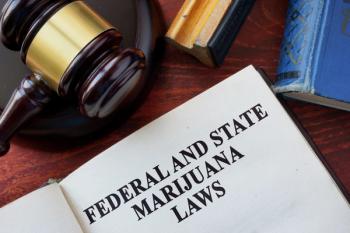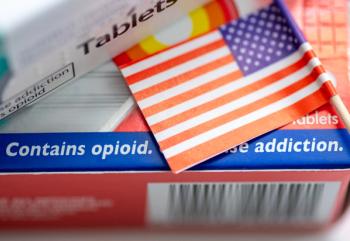
Breaking: FDA Approves OTC Designation for Naloxone Nasal Spray
Naloxone hydrochloride nasal spray (Narcan) 4 mg is expected to be available over the counter in late summer 2023.
The FDA has approved 4 mg naloxone hydrochloride nasal spray (Narcan) as the first OTC naloxone product approved for use without a prescription, according to an agency press release.1
This action, the FDA noted in the release, “paves the way for the life-saving medication…to be sold directly to consumers in places like drug stores, convenience stores, grocery stores and gas stations, as well as online.”1 Since its launch by Emergent BioSolutions in 2016, more than 44 million doses have been distributed in the United States.2
Drug overdoses continue to be a significant public health issue in the United States. During the 12-month period ending in October 2022, more than 101,750 fatal overdoses occurred, primarily due to the use of fentanyl and other synthetic opioids.
“Today’s landmark FDA OTC approval for [naloxone hydrochloride nasal spray] marks a historic milestone as we have delivered on our commitment to make this important emergency treatment widely accessible, given the alarming rates of opioid overdoses occurring across the country,” said Robert G. Kramer, president and CEO of Emergent Biosolutions.2 “We are dedicated to improving public health and assisting those working hard to end the opioid crisis. With leaders across government, retail, and advocacy groups, we must work together to continue increasing access and availability, as well as educate the public on the risks of opioid overdoses and the value of being prepared with Narcan Nasal Spray to help save a life.”
Both the timeline of availability and price will be determined by Emergent BioSolutions, and the company expects OTC availability to begin as in late summer 2023.2 The FDA will continue working with all relevant stakeholders to facilitate continued availability of naloxone nasal spray during the switch from prescription to OTC product. Notably, other formulations and doses of naloxone will remain available only by prescription.
Naloxone nasal spray was first approved in 2015 as a prescription product. To facilitate the switch from a prescription to OTC product, the manufacturer provided data showing that the drug can be used safely and effectively as directed in the proposed labeling; they were also required to demonstrate that consumers “can understand how to use the drug safely and effectively without the supervision of a health care professional.”
Per the agency, the application for the prescription to OTC switch was granted priority review status and was discussed during an advisory committee meeting in February 2023, where committee members voted unanimously in favor of OTC use.
Following this approval, OTC Narcan will require a change in labeling for the 4 mg generic naloxone nasal spray products that are currently approved, and that rely on Narcan is their reference listed drug product. Manufacturers will be required to submit a supplement to their applications to “effectively switch their products to OTC status.” The FDA also noted that this approval may impact the status of other brand-name naloxone nasal spray products in doses of 4 mg or less, but decisions will be made on a case-by-case basis.
“The FDA remains committed to addressing the evolving complexities of the overdose crisis,” said FDA Commissioner Robert M. Califf, MD, in the release.1 “As part of this work, the agency has used its regulatory authority to facilitate greater access to naloxone by encouraging the development of and approving an [OTC] naloxone product to address the dire public health need.”
He continued, “Today’s approval of OTC naloxone nasal spray will help improve access to naloxone, increase the number of locations where it’s available, and help reduce opioid overdose deaths throughout the country. We encourage the manufacturer to make accessibility to the product a priority by making it available as soon as possible and at an affordable price.”
“Naloxone is a critical tool in addressing opioid overdoses, and today’s approval underscores the extensive efforts the agency has undertaken to combat the overdose crisis,” said Patrizia Cavazzoni, MD, director of the FDA Center for Drug Evaluation and Research.1 “The FDA is working with our federal partners to help ensure continued access to all forms of naloxone during the transition of this product from prescription status to nonprescription/OTC status.”
“Further, we will work with any sponsor seeking to market a nonprescription naloxone product, including through an Rx to OTC switch, and encourage manufacturers to contact the agency as early as possible to initiate discussions,” Cavazzoni added.
Addressing substance use disorder remains a high priority for the agency, with numerous steps taken to help facilitate access to lifesaving naloxone products. The FDA Overdose Prevention Framework prioritizes supporting primary prevention; encouraging harm reduction; advancing the development of evidence-based treatments for substance use disorders; and protecting the public from unapproved, diverted, or counterfeit drugs that present overdose risks.
References
1. FDA approves first over-the-counter naloxone nasal spray. News release. FDA. March 29, 2023. Accessed March 29, 2023. https://www.fda.gov/news-events/press-announcements/fda-approves-first-over-counter-naloxone-nasal-spray
2. US FDA approves over-the-counter designation for Emergent BioSolutions’ Narcan Nasal Spray, a historic milestone for the opioid overdose emergency treatment. News release. Emergent BioSolutions. March 29, 2023. Accessed March 29, 2023. https://www.globenewswire.com/news-release/2023/03/29/2636825/0/en/U-S-FDA-Approves-Over-the-Counter-Designation-for-Emergent-BioSolutions-NARCAN-Nasal-Spray-a-Historic-Milestone-for-the-Opioid-Overdose-Emergency-Treatment.html
Newsletter
Pharmacy practice is always changing. Stay ahead of the curve with the Drug Topics newsletter and get the latest drug information, industry trends, and patient care tips.























